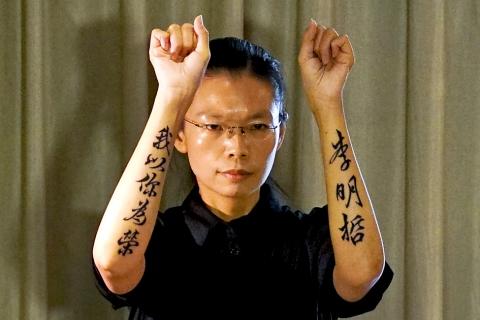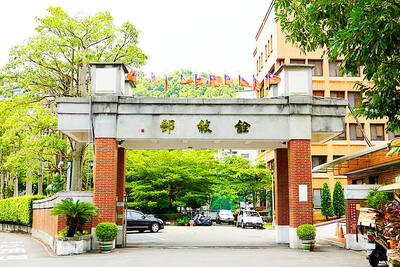Taiwanese human rights advocate Lee Ming-che (李明哲) yesterday confessed in a court in China to attempting to subvert the Chinese government, according to videos of his trial released by Chinese authorities, although his wife refused to recognize the court’s authority.
Lee, a community college teacher known for his pro-democracy and rights activism, went missing after entering China on March 19.
Chinese authorities later confirmed that he was being investigated on suspicion of damaging national security.

Photo: AP
Lee said that he accepted the charge of subversion and expressed regret in videos of his comments released on social media by the Yueyang City Intermediate People’s Court in Yueyang, Hunan Province.
“I spread some attacks, theories that maliciously attacked and defamed the Chinese government, the Chinese Communist Party and China’s current political system, and I incited the subversion of state power,” Lee said, referring to comments written in an instant messaging group.
Lee stood trial alongside Chinese national Peng Yuhua (彭宇華), 37, who confessed to creating instant messaging groups and founding an organization that sought to promote political change in China.
Lee had been involved in both, Peng said in testimony released on video by the court.
Judicial Reform Foundation executive secretary Hsiao Yi-ming (蕭逸民) traveled to China for the trial, but said he was barred from entering the courtroom.
Hsiao suspected Peng was being used by authorities to help strengthen the state’s case against Lee, as he was unaware of any previous connection between the two men.
“We contacted a lot of Lee’s friends in China, but no one has ever heard of Peng Yuhua,” Hsiao told reporters by telephone.
Lee’s wife, Lee Ching-yu (李凈瑜), attended the hearing.
Before leaving for China she had asked that Lee Ming-che’s supporters forgive him for anything he might say during the hearing that disappoints them.
She wrote a letter to her husband yesterday morning before the trial began, photographs of which were seen by reporters.
“I do not recognize this court. I also did not hire any lawyers,” she wrote.
No one answered the court telephone when called by reporters yesterday.
Releasing videos and transcripts of court hearings has become increasingly common in China as part of a push for greater judicial transparency and oversight.
However, rights activists said that in sensitive cases holding “open” trials allows authorities to demonstrate state power and deter others, with statements and verdicts usually agreed in advance.

Taiwan Semiconductor Manufacturing Co (TSMC, 台積電) is expected to start construction of its 1.4-nanometer chip manufacturing facilities at the Central Taiwan Science Park (CTSP, 中部科學園區) as early as October, the Chinese-language Liberty Times (the Taipei Times’ sister newspaper) reported yesterday, citing the park administration. TSMC acquired land for the second phase of the park’s expansion in Taichung in June. Large cement, construction and facility engineering companies in central Taiwan have reportedly been receiving bids for TSMC-related projects, the report said. Supply-chain firms estimated that the business opportunities for engineering, equipment and materials supply, and back-end packaging and testing could reach as high as

CHAMPIONS: President Lai congratulated the players’ outstanding performance, cheering them for marking a new milestone in the nation’s baseball history Taiwan on Sunday won their first Little League Baseball World Series (LLBWS) title in 29 years, as Taipei’s Dong Yuan Elementary School defeated a team from Las Vegas 7-0 in the championship game in South Williamsport, Pennsylvania. It was Taiwan’s first championship in the annual tournament since 1996, ending a nearly three-decade drought. “It has been a very long time ... and we finally made it,” Taiwan manager Lai Min-nan (賴敏男) said after the game. Lai said he last managed a Dong Yuan team in at the South Williamsport in 2015, when they were eliminated after four games. “There is

Democratic nations should refrain from attending China’s upcoming large-scale military parade, which Beijing could use to sow discord among democracies, Mainland Affairs Council Deputy Minister Shen You-chung (沈有忠) said. China is scheduled to stage the parade on Wednesday next week to mark the 80th anniversary of Japan’s surrender in World War II. The event is expected to mobilize tens of thousands of participants and prominently showcase China’s military hardware. Speaking at a symposium in Taichung on Thursday, Shen said that Chinese Minister of Foreign Affairs Wang Yi (王毅) recently met with Indian Prime Minister Narendra Modi during a visit to New Delhi.

FINANCES: The KMT plan to halt pension cuts could bankrupt the pension fund years earlier, undermining intergenerational fairness, a Ministry of Civil Service report said The Chinese Nationalist Party (KMT) caucus’ proposal to amend the law to halt pension cuts for civil servants, teachers and military personnel could accelerate the depletion of the Public Service Pension Fund by four to five years, a Ministry of Civil Service report said. Legislative Speaker Han Kuo-yu (韓國瑜) on Aug. 14 said that the Act Governing Civil Servants’ Retirement, Discharge and Pensions (公務人員退休資遣撫卹法) should be amended, adding that changes could begin as soon as after Saturday’s recall and referendum. In a written report to the Legislative Yuan, the ministry said that the fund already faces a severe imbalance between revenue